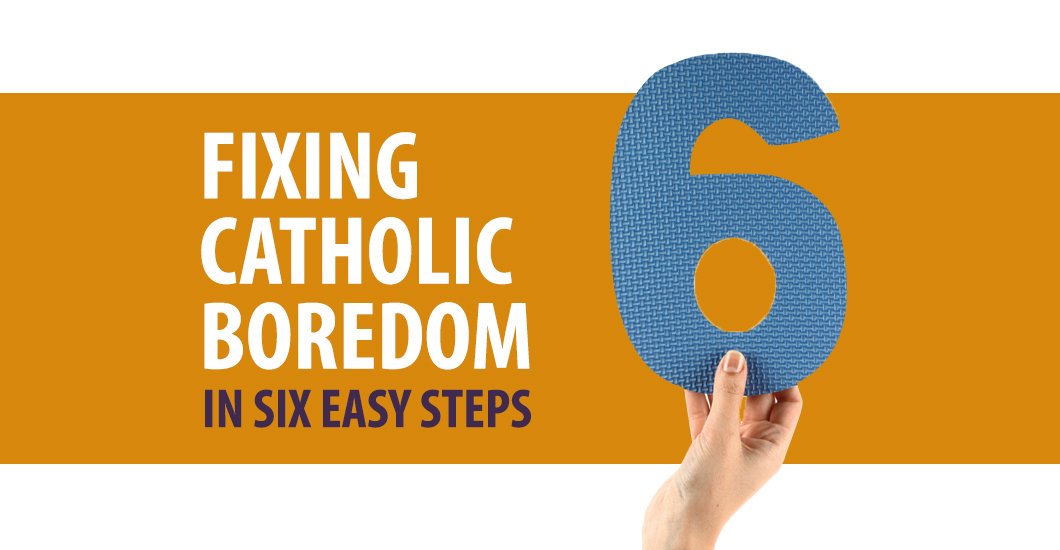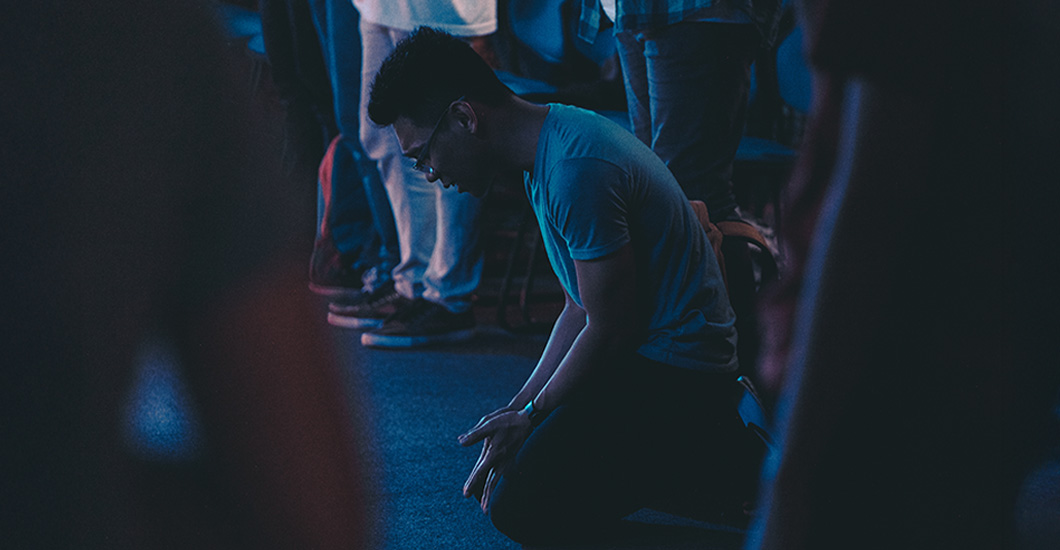Trending Articles
Fixing Catholic Boredom In Six Easy Steps
On a recent Saturday morning, my sixteen-year-old son said, “Dad, I’m bored. What are we going to do for fun today?”
Knowing my youngest son well, I translated this to mean that he was looking for something new and exciting and I was supposed to provide it. This all-too frequent discussion with my children has been the cause of considerable reflection of late. As adults do we also seek frequent engagement and entertainment? Does this desire for fun and excitement ever spill over into how we view our Catholic faith?
I often hear complaints that the “mass is boring,” “the priest is difficult to understand” or “the priest didn’t wow us with an exciting homily.” Still more complaints (whining?) center on the lack of exciting music during mass or the “inconvenience” of having to attend mass weekly as well as all the Holy Days of obligation. I also frequently hear this comment: “I wish our parish was more like (insert name of any Protestant megachurch). They have a lot of fun in their services and the music is awesome. They even have a coffee bar!” The list of complaints is likely much longer, but I think you get the picture.
Are we suffering from Spiritual A.D.D.?
Much has been written about the explosion of Attention Deficit Disorder (A.D.D.) in the past few decades. Many studies link kids’ over-stimulation from video games as a big contributor to the problem. Adults have the same challenges as we struggle with our own addictions to smart phones and information overload from computers, TV, etc. Is this problem spilling over into our spiritual lives? Do we go from parish to parish looking for some sort of “Catholic buzz” to keep us entertained? Do we flirt with hearsay by attending non-Catholic churches? Are our brains, craving more and more stimulation, incapable of finding peace? We need to tune out the “noise” to achieve the quiet and focus required in the mass.
Spiritual Shepherd or Entertainer-in-Chief?
Do we ever take a moment to consider the challenging life of a Catholic priest? In addition to being our spiritual shepherds, parish priests are the administrators of complex organizations often beset with unique problems ranging from people issues on the staff to budget shortfalls. Their days are filled with saying mass, presiding at weddings, funerals and baptisms, hearing Confessions, visiting the sick, prayer, study, meetings with parishioners and dozens of other duties we may not fully appreciate. They are not our entertainment directors. Before we complain about something these men of God did or did not do, we should reflect a little and say a prayer of thanksgiving for their life-long commitment to help us attain Heaven. These good men need our prayers and our support every single day. They do not need nor deserve much of the criticism that is sent their way.
The Eucharist
Do you ever notice that entering the church for mass these days often resembles people finding their seats in a theater before a movie begins? There is lots of noise and chit-chat all the way up to the beginning of mass. Where is the reverence? The respect? The humility? Time spent preparing to enter into the mysteries? We are about to receive Holy Communion, the body and blood, soul and divinity of our Lord Jesus Christ, but we sometimes treat this sacred time like a secular family reunion instead of a holy celebration. Maybe one of the reasons people feel bored with the mass is they have forgotten that the center of the mass is Jesus Christ in the Eucharistic sacrifice. “The Christian faithful are to hold the Holy Eucharist in highest honor, taking an active part in the celebration of the most august sacrifice, receiving this sacrament devoutly and frequently, and worshiping it with the highest adoration; pastors, clarifying the doctrine on this sacrament, are to instruct the faithful thoroughly about this obligation” (Code of Canon Law #898).
A little Self-Awareness and a desire to change
If anything that you have read so far sounds familiar and hits too close to home, there may be a problem and change needed. Too often we do not know how we are behaving and coming across to others unless we hear it from a friend. More importantly, if we are in the “complainer camp” can we change course? A thorough and honest examination of conscience provides an excellent way to identify our sinful behavior before having those sins forgiven by a priest in the Sacrament of Reconciliation. With more self-awareness and a contrite heart, it is only logical that we can now focus on what is really important about the mass and better understand the critical role the Church plays in our lives.
We cannot Be Bored if We Are Sincerely Seeking Him
Boredom is a side effect of our fast-paced, materialistic culture. We feel bored because we are constantly being over-stimulated and sold on the idea that we can have it all now and that something better is always around the corner. As rational human beings, we must realize that this is neither true nor sustainable. If we are sincerely seeking Christ, we will find Him through the Church He founded.
The world offers celebrities to idolize … the Church offers saints to follow.
The world offers noise … the Church offers peace.
The world offers false dreams … the Church offers the truth.
The world offers and celebrates vice … the Church offers a life of virtue.
The world offers earthly pleasures … the Church offers eternal heaven.
Fixing catholic Boredom in Six easy Steps
Every issue I posed has been an ongoing challenge for me and countless other people I know. We must realize this is not healthy behavior. How do we change? To sum up, here are the key points you have read, summarized into “Six Steps to Cure Catholic Boredom”:
1. “We have to turn off at least some of the noise.” Our spiritual A.D.D. is fed by our addiction to too much input from various sources. Do not listen to the radio in the car. Eliminate most, if not all, TV time. Read more books. Get outside more often. Find time for quiet reflection and prayer every day.
2. “Show more respect for our priests and quit looking to them for entertainment.” They are not here to make mass “exciting.” We are at mass to offer worship and receive the Eucharist, not to hear an emotional homily or loud music.
3. “Remember the mass is about the Eucharist.” Have we prayed to be worthy to receive Jesus? Have we thanked God for this gift? Have we prayed to let others see Christ in us? Reverence, gratitude, humility, worship … these are the keywords to remember about the mass.
4. “Go to Reconciliation as often as possible.” Do a thorough and honest examination of conscience. Where have we fallen short? Confess these sins to a priest and be forgiven. We will be less critical and eliminate boredom if we are acutely aware of our thinking and behaviors that lead to these avoidable sins.
5. “Get involved and make a difference.” Sitting on the outside and complaining is boring. Why not join a parish ministry and contribute our time and talent in a more productive way?
6. “Quit trying to please both the world and God.” “you cannot please both God and the world at the same time. They are utterly opposed to each other in their thoughts, their desires and their actions” (Saint John Vianney).
Feeling bored about our Catholic faith is subtle and dangerous—it sort of creeps up on you. When we are bored we tend to be critical and seek more excitement. This is the wrong path. The world offers us false gods and tries to paint a negative picture of Catholicism that is an illusion. We have to fight through these lies. Perceived boredom may lead some to leave the Church for other faiths. They are often drawn to the excitement and buzz of Protestant megachurches but will learn in time that they had everything they needed in the Church Jesus founded. Let us reflect on how we feel right now about the mass, priests, Church, etc. If we feel bored or critical, let us follow a sound road map to bring us back from this dangerous territory. We have so much to be thankful for as Catholics if we will only take the time to appreciate.
The choice is ours and I humbly pray that we will make the right one.
Randy Hain is the president of Serviam Partners Consulting/Coaching. He is the senior editor for the Integrated Catholic Life™, which he cofounded with Deacon Mike Bickerstaff in 2010. Hain is a prolific writer and frequent presenter on a number of topics including faith, family, Catholic men’s issues, fatherhood, faith/work integration, careers, authenticity, leadership and human capital. His latest work is “Special Children, Blessed Fathers: Encouragement for Fathers of Children with Special Needs.” A convert to the Catholic Faith in 2006, Hain and his wife have been married for twenty years and have two teenage sons.
Latest Articles
Want to be in the loop?
Get the latest updates from Tidings!








